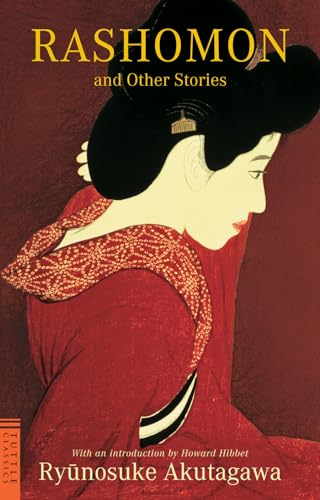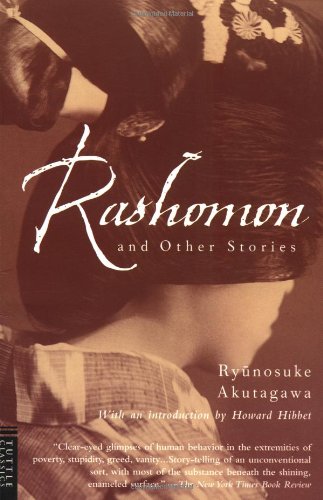takashi kojima akutagawa ryunosuke hibbet (5 Ergebnisse)
FeedbackSuchfilter
Produktart
- Alle Product Types
- Bücher (5)
- Magazine & Zeitschriften (Keine weiteren Ergebnisse entsprechen dieser Verfeinerung)
- Comics (Keine weiteren Ergebnisse entsprechen dieser Verfeinerung)
- Noten (Keine weiteren Ergebnisse entsprechen dieser Verfeinerung)
- Kunst, Grafik & Poster (Keine weiteren Ergebnisse entsprechen dieser Verfeinerung)
- Fotografien (Keine weiteren Ergebnisse entsprechen dieser Verfeinerung)
- Karten (Keine weiteren Ergebnisse entsprechen dieser Verfeinerung)
- Manuskripte & Papierantiquitäten (Keine weiteren Ergebnisse entsprechen dieser Verfeinerung)
Zustand Mehr dazu
- Neu (Keine weiteren Ergebnisse entsprechen dieser Verfeinerung)
- Wie Neu, Sehr Gut oder Gut Bis Sehr Gut (Keine weiteren Ergebnisse entsprechen dieser Verfeinerung)
- Gut oder Befriedigend (4)
- Ausreichend oder Schlecht (Keine weiteren Ergebnisse entsprechen dieser Verfeinerung)
- Wie beschrieben (1)
Einband
Weitere Eigenschaften
- Erstausgabe (Keine weiteren Ergebnisse entsprechen dieser Verfeinerung)
- Signiert (Keine weiteren Ergebnisse entsprechen dieser Verfeinerung)
- Schutzumschlag (Keine weiteren Ergebnisse entsprechen dieser Verfeinerung)
- Angebotsfoto (Keine weiteren Ergebnisse entsprechen dieser Verfeinerung)
Sprache (2)
Preis
- Beliebiger Preis
- Weniger als EUR 20
- EUR 20 bis EUR 45 (Keine weiteren Ergebnisse entsprechen dieser Verfeinerung)
- Mehr als EUR 45 (Keine weiteren Ergebnisse entsprechen dieser Verfeinerung)
Gratisversand
- Kostenloser Versand nach Deutschland (Keine weiteren Ergebnisse entsprechen dieser Verfeinerung)
Land des Verkäufers
Verkäuferbewertung
-
EUR 6,52
Währung umrechnenEUR 5,51 für den Versand von USA nach DeutschlandAnzahl: 1 verfügbar
In den WarenkorbZustand: Good. Used book that is in clean, average condition without any missing pages.
-
Rashomon and Other Stories (Tuttle Classics)
Anbieter: Goldstone Books, Llandybie, Vereinigtes Königreich
EUR 11,57
Währung umrechnenEUR 5,72 für den Versand von Vereinigtes Königreich nach DeutschlandAnzahl: 1 verfügbar
In den Warenkorbpaperback. Zustand: Very Good. All orders are dispatched within one working day from our UK warehouse. We've been selling books online since 2004! We have over 750,000 books in stock. No quibble refund if not completely satisfied.
-
EUR 7,99
Währung umrechnenEUR 21,58 für den Versand von USA nach DeutschlandAnzahl: 1 verfügbar
In den WarenkorbZustand: Very Good. Very Good condition. A copy that may have a few cosmetic defects. May also contain light spine creasing or a few markings such as an owner's name, short gifter's inscription or light stamp.
-
Rashomon And Other Stories
Verlag: Charles E. Tuttle Co, Tokyo, Japan, 1952
Anbieter: Ground Zero Books, Ltd., Silver Spring, MD, USA
EUR 15,56
Währung umrechnenEUR 25,89 für den Versand von USA nach DeutschlandAnzahl: 1 verfügbar
In den WarenkorbHardcover. Reprint. Ninth printing, 1968. 102, [2] p. Six strories by the Tokyo author who committed suicide in 1927. Two stories, "Rashomon" and "In a Grove" were the basis of the Kurosawa film. This is the first appearance in English of "In a Grove" and the first English language appearance of both together. From Wikipedia: "Ry nosuke Akutagawa (1 March 1892 24 July 1927) was a Japanese writer active in the Taisho period in Japan. He is regarded as the "Father of the Japanese short story" and Japan's premier literary award, the Akutagawa Prize, is named after him. He committed suicide at age of 35 through an overdose of barbital.In 1914, Akutagawa and his former high school friends revived the literary journal Shinshicho ("New Currents of Thought"), publishing translations of William Butler Yeats and Anatole France along with their own works. Akutagawa published his first short story Rash mon the following year in the literary magazine Teikoku Bungaku ("Imperial Literature"), while still a student. The story, based on a twelfth-century tale, was noticed by author Natsume S seki. Encouraged by the praise, Akutagawa thereafter considered himself Soseki's disciple, and began visiting the author for his literary circle meetings every Thursday. It was also at this time that he started writing haiku under the haigo (or pen-name) Gaki. These meetings led to Hana ("The Nose", 1916), which was published in Shinshicho. Akutagawa followed with a series of short stories set in Heian period, Edo period or early Meiji period Japan. These stories reinterpreted classical works and historical incidents. Examples of these stories include: Gesaku zanmai ("A Life Devoted to Gesaku", 1917) and Kareno-sho ("Gleanings from a Withered Field", 1918), Jigoku hen ("Hell Screen", 1918); H kyonin no shi ("The Death of a Christian", 1918), and Butokai ("The Ball", 1920). Akutagawa was a strong opponent of naturalism. He published Mikan ("Mandarin Oranges", 1919) and Aki ("Autumn", 1920) which have more modern settings. In 1921, Akutagawa interrupted his writing career to spend four months in China, as a reporter for the Osaka Mainichi Shinbun. The trip was stressful and he suffered from various illnesses, from which his health would never recover. Shortly after his return he published Yabu no naka ("In a Grove", 1922). The final phase of Akutagawa's literary career was marked by his deteriorating physical and mental health. Much of his work during this period is distinctly autobiographical, some even taken directly from his diaries. His works during this period include Daidoji Shinsuke no hansei ("The Early Life of Daidoji Shinsuke", 1925) and Tenkibo ("Death Register", 1926). Akutagawa attacked author Jun'ichiro Tanizaki by claiming that structure was more important than lyricism in a story. Akutagawa's final works include Kappa (1927), a satire based on a creature from Japanese folklore, Haguruma ("Spinning Gears", 1927), Aru aho no issho ("A Fool's Life"), and the Bungeiteki na, amari ni bungeiteki na ("Literary, Much Too Literary", 1927). Towards the end of his life, Akutagawa began suffering from visual hallucinations and nervousness over fear that he had inherited his mother's mental disorder. In 1927 he tried to take his own life, together with a friend of his wife, but the attempt failed. He finally committed suicide by taking an overdose of Veronal, which had been given to him by Saito Mokichi on July 24 of the same year. His dying words in his will claimed he felt a "vague insecurity".about the future. He was 35 years old. Akutagawa wrote no full-length novels, focusing instead on short stories of which he wrote over 150 during his brief life. The classic film Rash mon (1950) directed by Akira Kurosawa retells the Akutagawa's story "In a Grove." The title and the frame scenes set in the Rashomon Gate are taken from Akutagawa's story, "Rashomon." Ukrainian composer Victoria Poleva has written the ballet Gagaku (1994), based on Akutagawa's Hell Screen. Japanese composer Mayako Kubo has.
-
EUR 10,56
Währung umrechnenEUR 21,58 für den Versand von USA nach DeutschlandAnzahl: 1 verfügbar
In den WarenkorbZustand: Very Good. Very Good condition. No Dust Jacket 2nd edition. (Japan, Japanese Literature, Short Stories).




